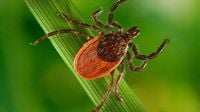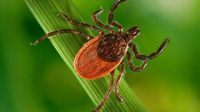The tick season has begun earlier than usual this year, thanks to fluctuating temperatures that have favored the multiplication of these insects since April 2025. Health authorities are warning the public about the increasing risks associated with tick bites, particularly in light of a significant rise in cases of Lyme disease. According to the National Agency for Public Health (ANSP), 249 people were diagnosed with Lyme disease in 2024, up from 185 in 2023.
Specialists estimate that approximately 30% of ticks carry pathogens, such as bacteria and parasites, that can lead to serious illnesses. Contrary to popular belief, ticks are not only found in forests; they can also inhabit parks, gardens, and even the edges of sidewalks. A simple stroll outdoors can be enough for a tick to latch onto the skin.
The bite itself is often painless, as ticks inject an anesthetic substance that numbs the affected area, making it difficult for individuals to detect their presence. Doctors are cautioning that improper removal of ticks at home, particularly through traditional methods, can exacerbate the situation. If bitten, it is recommended to seek immediate medical attention to ensure the tick is removed correctly and appropriate treatment is administered.
The ANSP has issued several recommendations to reduce the risk of tick bites. They advise using repellents, covering arms and legs with long sleeves and pants, and wearing closed, light-colored shoes. Avoiding sandals in risky areas is also recommended. When enjoying outdoor activities, individuals should opt for light-colored clothing and picnic blankets to make it easier to spot ticks. During hikes, it's best to stick to the middle of paths and avoid brushing against surrounding plants. If sleeping outdoors, using insect nets around beds and protective tarps is essential.
Moreover, citizens are encouraged to check their clothes and bodies for ticks after returning from nature, paying particular attention to areas with thin skin, such as underarms, groin, knees, abdomen, neck, and head. Pets should also be inspected regularly. Following outdoor activities, it’s crucial to shower and wash clothes thoroughly.
In the event of a tick bite, the ANSP provides guidelines for safe removal. First, wash your hands with soap and water, and prepare a pair of sharp-tipped tweezers and a tincture of iodine (3-5%) or 70% ethyl alcohol. Grasp the tick as close to its head as possible and pull it out steadily without twisting or crushing it. After removal, disinfect the bite area with soap and water, followed by an antiseptic solution.
It’s vital to ensure the tick is removed entirely without breaking its body, as leaving part of the tick embedded can lead to infection. The use of heat or oils to neutralize the tick is not recommended, as this may cause the tick to burrow deeper into the skin, releasing more saliva or stomach contents into the wound, which raises the risk of infection.
Not all ticks carry the bacteria responsible for Lyme disease, so not every bite poses a risk of developing the illness. However, monitoring the health of anyone bitten is essential. If symptoms such as erythema migrans (a characteristic rash), moderate fever, weakness, joint or muscle pain, and swollen lymph nodes appear, prompt medical consultation is advised.
The 2024 statistics reveal a concerning trend, as there were 249 cases of tick-borne diseases reported, marking an increase from 185 cases in 2023. Among these, 88 cases of Lyme disease were recorded in children aged up to 17 years, with 7 cases occurring in children under 2 years old.
With the tick season now in full swing, health officials are stressing the importance of vigilance. They urge the public to remain cautious, especially in areas with abundant vegetation, and to take preventive measures seriously. Wearing appropriate clothing and using repellents are simple yet effective strategies to minimize the risk of tick bites.
As the warmer months approach, the need for awareness and proactive measures becomes even more critical. Engaging with nature is a cherished pastime for many, but understanding the potential risks associated with ticks can help ensure that outdoor experiences remain safe and enjoyable.





